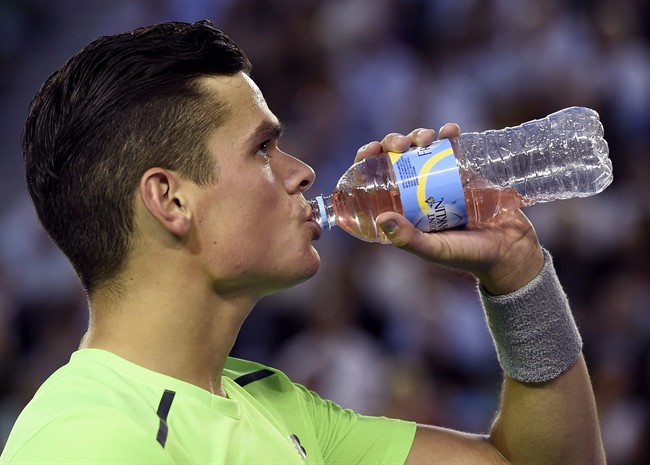TORONTO – Dehydration may not be the threat to sporting performance that athletes have been led to believe, a new study suggests.

For several decades the mantra in sports has been “hydrate, hydrate, hydrate” — a tenet based on the belief that not replenishing the fluids and salts sweated out during exercise is both bad for athletes’ health and their success.
But a novel study conducted at Brock University in St. Catharines, Ont., found that competitive athletes performed equally well regardless of whether they were hydrated or dehydrated, thirsty or not experiencing the sensation of thirst.
Lead author Stephen Cheung said the dehydrated athletes did have higher core temperatures and heart rates, though.
READ MORE: Wendy’s drops soda from kids’ menu in Canada, U.S.
“Your body is more stressed with dehydration. So no questions there. But the performance was not different. And also none of these competitive elite athletes were at any (health) danger,” said Cheung, a professor and a Canada research chair in environmental ergonomics.
The public should not interpret the results to mean that there is no need to rehydrate, Cheung insisted.
“Obviously dehydration is bad at a severe level,” he said.
But the study results do test the notion that people need to constantly top up their fluids while exercising, he said.
- Naloxone-resistant street drug linked to 9 deaths in Eastern Canada seized in Alberta
- ‘She gets to be 10’: Ontario child’s heart donated to girl the same age
- Buzz kill? Gen Z less interested in coffee than older Canadians, survey shows
- Bird flu risk to humans an ‘enormous concern,’ WHO says. Here’s what to know
“That is the common message that we are bombarded with. And I’m suggesting that there are certainly some cases where hydration is not as critical as it has been made out to be.”
READ MORE: How fast food tried to get svelte in 2014
In the 1990s, the American College of Sports Medicine issued a statement declaring that people exercising should replace all the fluids they were sweating out. In 2007 that position was modified to suggest people should not allow themselves to lose more than two per cent of their body weight through sweat during exercise, Cheung said.
In Cheung’s study, 11 competitive cyclists and triathletes were put through their paces at 35 C.
All were hooked up to intravenous fluids. Some received a volume of saline (salt water) equivalent to what they were sweating out, while for the others, the IV was not turned on. Neither the cyclists nor the researchers knew during each trial who was being hydrated and who was not getting replacement fluids.
As well, some riders were allowed to rinse their mouths to alleviate the sensation of thirst while others were not. The idea there was to see whether the sensation of thirst had an impact on how well the athletes were able to perform.
READ MORE: McDonald’s confronts its junk food image as sales flag
Over the course of four different trials — conducted a week apart — the researchers gathered data on four conditions: hydrated and not thirsty, hydrated and thirsty, dehydrated and thirsty, and dehydrated and not thirsty.
In the trials, the athletes cycled for 90 minutes, during which time their fluid levels were either topped up or not. Those who did not get replacement fluids had lost between two per cent and three per cent of their body weight — more than the sports medicine college recommends.
After a 10-minute break they were put through a 20-kilometre competitive time trial in which they were told to cycle as hard as they could. Their performances were measured every two kilometres.
When it came to performance, there were no statistically significant differences between the four groups.
READ MORE: Chemical in Subway bread also in Canada, but will be removed, company says
“You can, for a short term, tolerate dehydration and still perform very well,” Cheung said, noting the findings support the practice among elite marathon runners, who often drink little during a race.
The study is published in the June issue of the Scandinavian Journal of Medicine and Science in Sports.



Comments